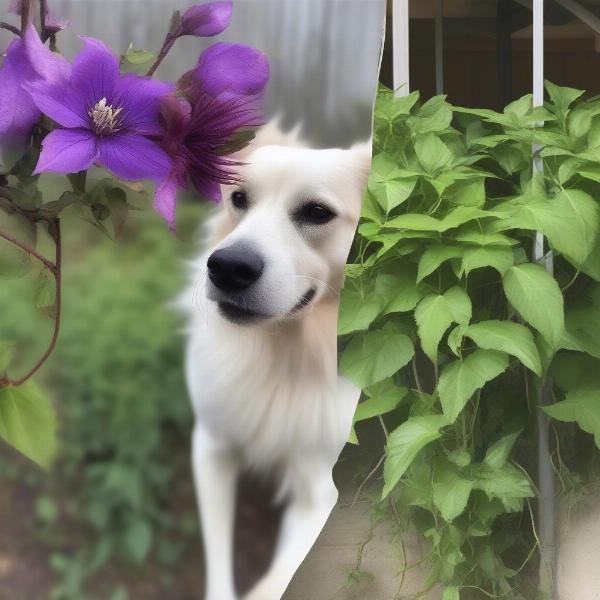Knowing which plants are safe for our canine companions is crucial for responsible pet ownership. Many dogs love exploring the garden, sniffing, and sometimes even nibbling on plants. Understanding which outdoor vines are safe for dogs can help prevent accidental poisoning and ensure a happy, healthy environment for your furry friend. This guide will explore a variety of non-toxic vines perfect for adding beauty and structure to your garden while keeping your dog safe.
Choosing Dog-Safe Climbing Plants
When selecting vines for your dog-friendly garden, opting for non-toxic varieties is paramount. Some popular climbing plants, like wisteria and clematis, can be toxic to dogs if ingested. Therefore, it’s essential to research and choose vines that pose no threat to your pet’s health.
Some excellent choices for dog-safe climbing plants include:
- Crossvine (Bignonia capreolata): This beautiful vine boasts vibrant trumpet-shaped flowers and is known for its hardiness.
- Climbing Roses (Rosa spp.): While thorns can be a concern, many thornless varieties are available. Ensure they are pesticide-free.
- Moonflower Vine (Ipomoea alba): These fragrant, night-blooming flowers add a touch of magic to any garden.
Identifying Potentially Harmful Vines
Several common outdoor vines are toxic to dogs and should be avoided:
- Wisteria (Wisteria spp.): All parts of the wisteria plant, especially the seeds and pods, contain toxins that can cause vomiting, diarrhea, and even depression in dogs.
- Clematis (Clematis spp.): This popular flowering vine contains irritants that can cause oral irritation, drooling, and vomiting if ingested by dogs.
- English Ivy (Hedera helix): Ingestion of English ivy can lead to gastrointestinal upset, including vomiting and diarrhea, in dogs.
 Toxic Vines for Dogs
Toxic Vines for Dogs
Creating a Safe and Stimulating Garden for Your Dog
Beyond choosing safe plants, consider other elements to make your garden a dog-friendly haven:
- Designated Digging Area: If your dog enjoys digging, create a designated digging area with loose soil or sand.
- Shady Spots: Provide ample shade for your dog to cool down on hot days, especially in warmer climates.
- Fresh Water Source: Ensure a readily available source of fresh, clean water.
- Dog-Friendly Pathways: Create clear pathways using dog-safe materials like mulch or pavers.
Conclusion
Creating a beautiful and safe outdoor space for your dog requires careful planning and consideration. By selecting dog-safe vines and incorporating other dog-friendly elements, you can enjoy your garden together, knowing your furry friend is safe and happy. Remember to research any new plants before introducing them to your garden and always supervise your dog while outdoors.
FAQ
- What should I do if my dog eats a potentially toxic plant? Immediately contact your veterinarian or the ASPCA Animal Poison Control Center.
- Are all roses safe for dogs? While most roses are not highly toxic, thorns can pose a risk. Opt for thornless varieties and ensure they are pesticide-free.
- What are some other dog-safe climbing plants? Consider Virginia creeper, honeysuckle (certain varieties), or passionflower vine.
- How can I discourage my dog from chewing on plants? Provide plenty of chew toys and train your dog with commands like “leave it.”
- What type of mulch is safe for dogs? Cedar and pine mulch are generally safe, while cocoa mulch can be toxic.
- How can I make my garden more stimulating for my dog? Add elements like tunnels, raised platforms, or a shallow wading pool.
- What are some signs of plant poisoning in dogs? Symptoms can include vomiting, diarrhea, lethargy, drooling, and tremors.
can dogs eat grapes australia
dog safe climbing plants
dog eats mulch
dog friendly wineries margaret river
About ILM Dog:
ILM Dog is your go-to resource for expert advice on dog breeds, health, training, nutrition, grooming, and much more. We offer practical tips and insights for dog owners of all experience levels. Whether you’re a seasoned dog parent or just starting your journey, we’re here to help you provide the best possible care for your canine companion. Contact us for expert guidance: Email: [email protected], Phone: +44 20-3965-8624.